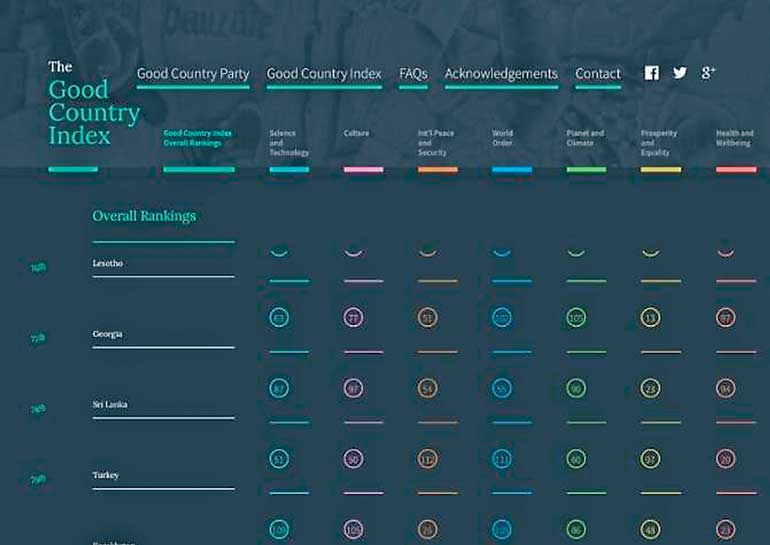Saturday Feb 21, 2026
Saturday Feb 21, 2026
Wednesday, 29 July 2015 00:20 - - {{hitsCtrl.values.hits}}

Due to the heavy impact of globalisation, nations have started competing with each other even more aggressively to get a share of attention, respect, potential consumers, investors, media and tourists. As the globe becomes a single market a positive and strong nation brand (NB) can provide a sustainable competitive advantage to a country.
Countries depend enormously on their reputation to survive and prosper in the world. If a country had a great positive image like Switzerland, new Zealand, Germa ny or Sweden everything become easier and cheap. You will get more tourists, more investors, and whatever you produced can call for a premium. If your image is weak or negative then everything will become expensive and more difficult.
ny or Sweden everything become easier and cheap. You will get more tourists, more investors, and whatever you produced can call for a premium. If your image is weak or negative then everything will become expensive and more difficult.
It’s clear that a home country with strong positive and universally-recognised associations of trust, quality and integrity is a major advantage to its manufacturers as they face harsh realities of global competition. In this respect, it’s just like the way a new product from a well-known company is accepted by loyal consumers: the “parent brand” stands in as a proxy for personal experience of the product, and encourages trial in a way which a new product from an unknown company can almost never do.
Therefore managing reputation of nations is paramount and it is known as “place branding” or “nation branding”. Place branding is where principles of corporate branding extend to brand, countries ornations. Several indexes such as future brand country index, GFT index, bloom country brand ranking, country rep track and brand finance country index came into effect as a result of importance of nation branding.
Country branding
Many countries initiated country branding exercises. Few like 100% pure New Zealand were successful and most were unsuccessful. However studying of the “country branding” concept has pragmatically taken another direction after groundbreaking research conducted by S. Anholt two years ago. 
S. Anholt who introduced GFK Brand index in 2005 developed a large database cutting across all five continents of the world and includes 70% of the world population. It has 200 billion data points tracking on what ordinary people think about other countries and why they think so.
Two years ago as a result of the confusion of the concept of nation branding on what builds a good country reputation, a research was conducted with a worldwide sample from the aforesaid GFK data base. A question was asked from respondents why some prefer a certain country more than the others. Answers received surprised the research team. “Kind of countries we prefer are good countries. We don’t admire countries primarily because they’re rich, because they’re powerful, because they’re successful, because they’re modern, because they’re technologically advanced. We primarily admire countries that are good” said respondents.
“ What do we mean by good?” “We mean countries that seem to contribute something to the world in which we live, countries that actually make the world safer or better or richer or fairer. Those are the countries we like.”
This is a discovery of significant importance. After having analysed the results S. Anholt says: “To any government, in order to do well, you need to do good.” If you wa nt to sell more products, if you want to get more investment, if you want to become more competitive, then you need to start behaving, because that’s why people will respect you and do business with you, and therefore, the more you collaborate, the more competitive you become.
nt to sell more products, if you want to get more investment, if you want to become more competitive, then you need to start behaving, because that’s why people will respect you and do business with you, and therefore, the more you collaborate, the more competitive you become.
According to S. Anholt, good country means countries that seem to contribute something to the world, countries that actually make the world safer, or better or richer or fairer.
Good Country Index
Research findings also gave several insights. When you’re talking about a good country, you can be good, gooder and goodest. It’s not the same thing as good, better and best. This is a country which simply gives more to humanity than any other country. Therefore for a country to have a good reputation, you need to do good things.
If a country requires to sell more products, get more investments, or become competitive, it needs to start behaving good, as that is what people will respect you for and do business with you. The more you collaborate, the more competitive you become. This is the basis of the Good Country Index.
The aforesaid important discovery gave birth to the Good Country Index. It measures, or at least it tries to measure, exactly how much each country on earth contributes not to its own population but to the rest of humanity. Bizarrely, nobody had ever thought of measuring this before. Good Country Index is not about money; it is about an attitude and culture. It is about governments and people who care about the rest of the world and have imagination and courage to think outwards instead of only thinking inward.
Microscopic minds
Then the question, why are countries so slow to respond to this “good” phenomenon which enhances their brand reputation? There are, of course, a number of reasons. According to Anholt, the primary reason is because we’re still organised as a species in the same way that we were organised 200 or 300 years ago.
There’s one superpower left on the planet and that is the seven billion people, the seven billion of us who cause all these problems, the same seven billion, by the way, who will resolve them all. But how are those seven billion organised? They’re still organised in 200 or so nation-states and the nations have governments that make rules and cause us to behave in certain ways. And that’s a pretty efficient system, but the problem is that the way that those laws are made and the way those governments think may not be in line for the solution of global problems, because it all looks inwards.
Anholt says: “Most politicians that we elect and most politicians we don’t elect, on the whole, have minds that microscope. They don’t have minds that telescope.” They look in, they pretend, they behave, as if they believed that every country was an island that existed quite happily, independently of all the others on its own little planet in its own little solar system.
This is the problem: countries competing against each other, countries fighting against each other. This week, as any week you care to look at, you’ll find people actually trying to kill each other from country to country, but even when that’s not going on, there’s competition between countries, each one trying to beat the next.
Pressure on leaders
Simon argues that there are several reasons for countries looking inward. First and most obvious reason is because that’s what we ask our leaders. That’s what we tell them to do.
“When we elect governments or when we tolerate unelected governments, we’re effectively telling them that what we want is for them to deliver us in our country a certain number of things. We want them to deliver prosperity, growth, competitiveness, transparency, justice and all of those things. So unless we start asking our governments to think outside a little bit, to consider the global problems that will finish us all if we don’t start considering them. Then we can hardly blame them if what they carry on doing is looking inwards, if they still have minds that microscope rather than minds that telescope,” says Anholt.

Lack of empathy
The second reason Simon points out is that many governments lack the ability to really empathise with other human beings. “When they look around, they don’t see other human beings with deep, rich, three-dimensional personal lives and aims and ambitions. What they see is cardboard cutouts, and it’s very sad and it’s very lonely, and it’s very rare. In the absence of empathy we fail to look at great goodness” says Anholt.
Domestic agenda vs. international agenda
The third reason is hardly worth mentioning. But there’s a belief amongst governments that the domestic agenda and the international agenda are incompatible and always will be. Anholt commenting on this states: “In my day job, I’m a policy adviser. I’ve spent the last 15 years or so advising governments around the world, and in all of that time I have never once seen a single domestic policy issue that could not be more imaginatively, effectively and rapidly resolved than by treating it as an international problem, looking at the international context, comparing what others have done, bringing in others, working externally instead of working internally.”
Aversion to change
And so you may say, well, given all of that, why then doesn’t it work? Why can we not make our politicians change? Why can’t we demand it of them? “We should just accept that we are an inherently conservative species. We don’t like to change. It exists for very sensible evolutionary reasons. We probably wouldn’t still be here today if we weren’t so resistant to change. It’s very simple: Many thousands of years ago, we discovered that if we carried on doing the same things, we wouldn’t die, because the things that we’ve done before by definition didn’t kill us, and therefore as long as we carry on doing them, we’ll be okay, and it’s very sensible not to do anything new, because it might kill you. But of course, there are exceptions to that. Otherwise, we’d never get anywhere. And one of the exceptions, the interesting exception, is when you can show to people that there might be some self-interest in them making that leap of faith and changing a little bit,” says Anholt.
Why does the Good Country Index exist?
The final question is, “Why does the Good Country Index exist?” Simon states: “It’s there really because I want to try to introduce this word, or reintroduce this word, into the discourse. I’ve had enough hearing about competitive countries. I’ve had enough hearing about prosperous, wealthy, fast-growing countries. I’ve even had enough hearing about happy countries because in the end that’s still selfish. That’s still about us, and if we carry on thinking about us, we are in deep, deep trouble. I think we all know what it is that we want to hear about. We want to hear about good countries, and so I want to ask you all a favour. I’m not asking a lot. It’s something that you might find easy to do and you might even find enjoyable and even helpful to do, and that’s simply to start using the word ‘good’ in this context.”
When you think about your own country, when you think about other people’s countries, when you think about companies, when you talk about the world that we live in today, start giving meaning to the word “good” by altering.
Simon further states: “I would like you to use this as a stick with which to beat your politicians. When you elect them, when you re-elect them, when you vote for them, when you listen to what they’re offering you, use that word, ‘good,’ and ask yourself, ‘Is that what a good country would do?’ And if the answer is no, be very suspicious. Ask yourself; is that the behaviour of my country? Do I want to come from a country where the government, in my name, is doing things like that? Or do I, on the other hand, prefer the idea of walking around the world with my head held high thinking, ‘Yeah, I’m proud to come from a good country’? And everybody will welcome you. And everybody in the last 15 seconds before they drift off to sleep at night will say, ‘Gosh, I’m glad that person’s country exists.’”